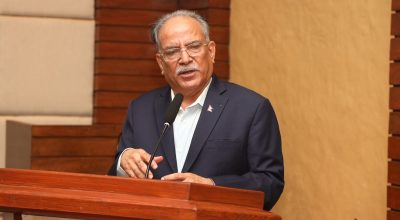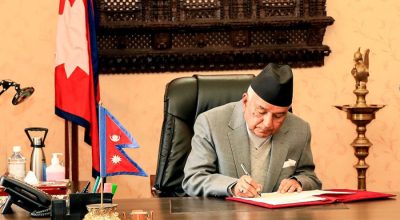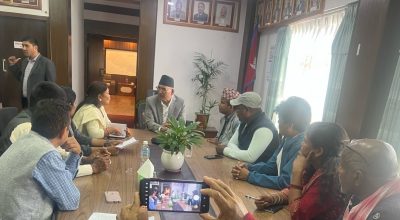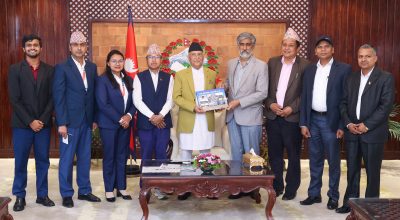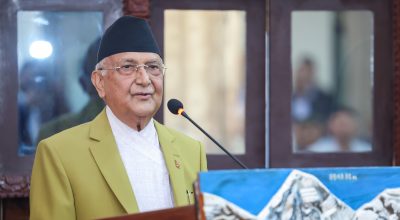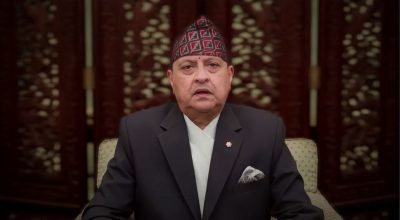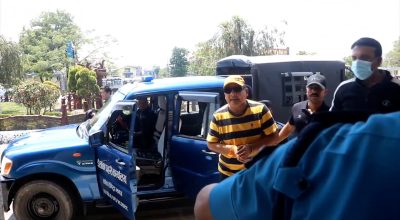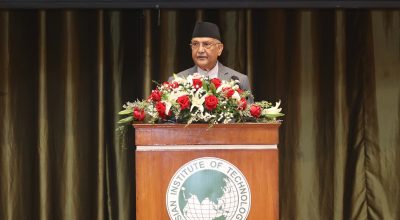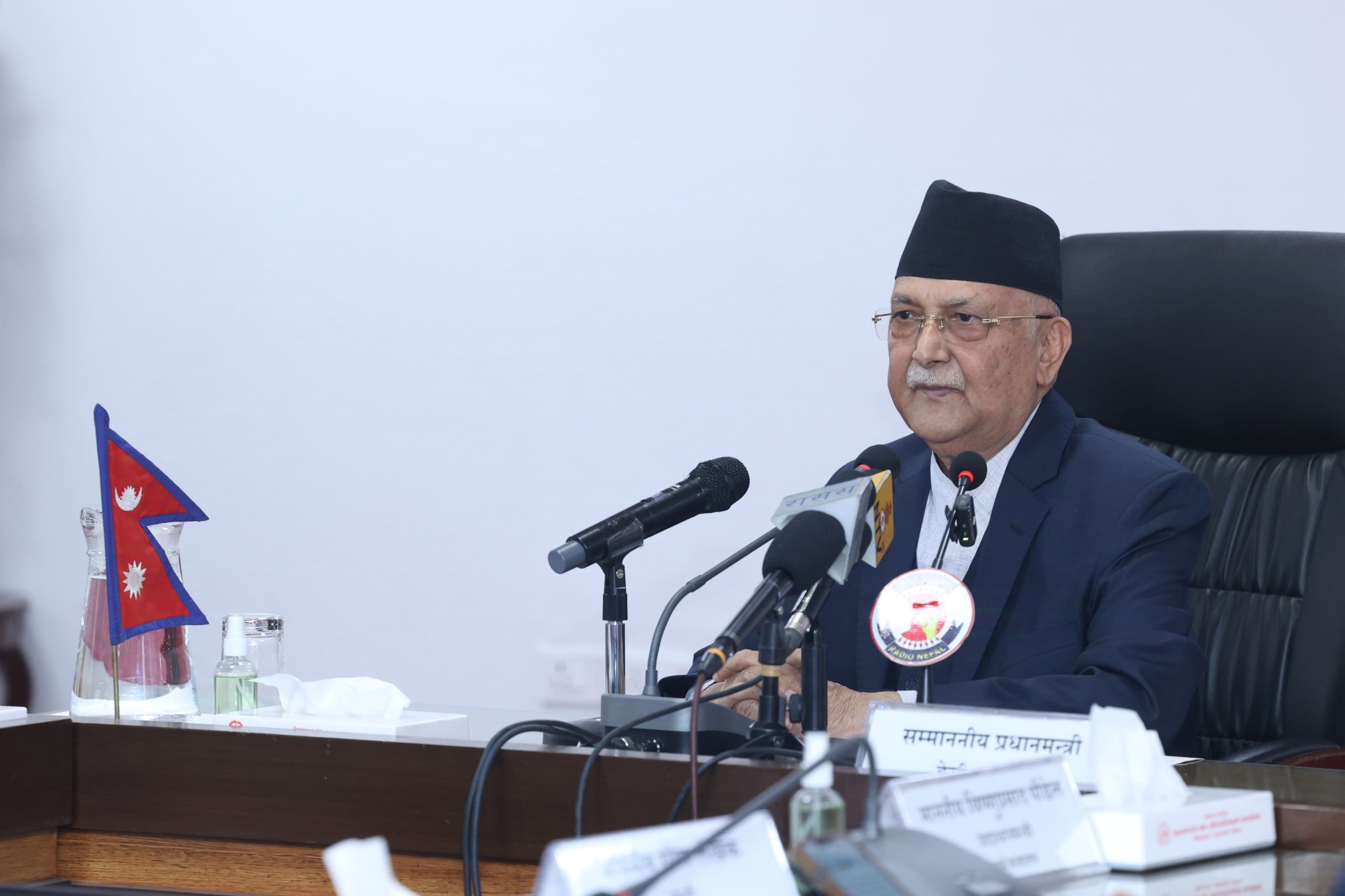
KP Sharma Oli
On the day I took the oath of office on Ashad 31, I did so not in the name of any deity, but in your name. This government has been formed based on your hope, your dreams, and your trust.
There are two reasons I took the oath in your name.
First, this government was formed due to your faith and trust.
Second, this government is for you.
Today, we complete one hundred days in power. However, I am not here to present a long list of statistics. What do numbers mean in themselves? What truly matters are the lives they touch, the alleviation of pain they bring, and the beautiful future they signify.
On Srawan 6, I presented five priorities for this government while seeking a vote of confidence in Parliament. The first priority of the government has been to “advance the works that have been initiated and complete them within the stipulated time.”
In the first hundred days, we planned the tasks to be undertaken by each ministry, determining how to complete them on time. Based on this, we entered into performance agreements between the Prime Minister and ministers. All ministries created a list of tasks to be completed in the first hundred days, the second hundred days, and the remaining days. In the first hundred days, the total number of tasks to be completed by all ministries reached 274, of which 185 tasks have been completed. This means the government has completed about 70% of what it promised. Had nature not intervened, the remaining 30% would have been completed as well.
When I took the oath as the new Prime Minister, we were mourning the tragic incident of a bus carrying pilgrims that went missing in the Trishuli River. Shortly after, there were incidents of plane crashes and landslides that affected the nation. From Ashoj 10 to 13, the country faced unprecedented floods and landslides. During this period, there were 7,135 different types of disaster incidents across the country, resulting in significant loss of life and property. Crops, livestock, and essential infrastructure like roads, bridges, drinking water, communication, schools, and electricity were severely damaged.
In response, we prioritized immediate rescue and relief efforts for affected families, focusing on providing essential infrastructure and services. The families of the 391 people who died in the floods received relief of 200,000 each. A total of 2,555 families affected by the floods received immediate relief of 45 million. We allocated 430 million to 71 local levels in disaster-stricken areas.
We have also prioritized temporary housing arrangements after assessing the initial damage. We are currently working on rebuilding the physical infrastructure damaged by the floods and landslides, with plans in place to restore essential services like drinking water, electricity, roads, and communication within 15 days.
During this time, the major festival of Dashain arrived. Many roads were damaged, and there was significant anxiety among the people due to the natural disasters. However, the government managed these challenges efficiently. As a result, the roads leading to the capital were restored, and traffic resumed on the BP Highway. This year, around 814,246 people returned home for Dashain, with 111,154 vehicles leaving the Kathmandu Valley.
A year ago, areas like Jajarkot, Rukum West, Bajhang, Bajura, and Doti were severely affected by an earthquake. Reconstruction efforts in those areas should have commenced long ago, but the detailed damage assessment was not even completed. We have addressed this issue through the Disaster Risk Reduction and Management National Council, completing a detailed damage assessment and deciding to allocate the necessary budget for the reconstruction of permanent housing within 15 days.
Our goal is to restore stability and security to the lives of the affected people, and we will proceed with the reconstruction of homes damaged by last year’s earthquake along with those affected by this year’s floods and landslides.
While natural disasters slowed down the government’s work, we continued to move forward. For a long time, over 3 million farmers in 35 districts had been struggling due to non-payment for milk. In the past hundred days, approximately 1.5 million dairy farmers received their payments, totaling 600 million. Similarly, around 75,000 sugarcane farmers, who had not received payment for years, have also received their dues.
Thousands of farmers included in crop and livestock insurance have also been relieved as 800 million was transferred to the insurance authority for their payments. We have ensured the supply of chemical fertilizers needed for winter crops.
We promised in Parliament that construction contractors who had not been paid for completed work would receive timely payments. In this period, 675 million has been paid to contractors from federal ministries.
Another priority I mentioned while seeking the vote of confidence was the promotion of entrepreneurship. There is a prevailing narrative that there are no job opportunities for working youth in the country, forcing them to seek employment abroad. The Ministry of Industry has provided startup loans of up to 2.5 million without collateral to 165 youth through an open application process. They have begun repaying their loans.
This year, 5,158 entrepreneurs applied for startup loans, and we are preparing to provide loans by the end of December to selected applicants.
During the confidence vote, I stated, “We will take legal action against corruption that has occurred at any time and against any corrupt individual.” Today, I stand here affirming that those who misappropriated funds in cooperatives have been brought into the fold of the law. Legal action has begun against over 600 individuals involved in cooperative fraud, with more than 575 currently imprisoned. Not only are we taking action against cooperative fraud, but we are also working on drafting the Cooperative Authority Act and establishing a Cooperative Loan Information Center and Loan Recovery Tribunal.
Anti-corruption and good governance should not be temporary measures; they must be institutionalized. Our focus in combating corruption is on law, not cameras. Our priority is to establish a legal framework that effectively controls corruption rather than relying on temporary sensationalism.
We have observed elements trying to spread instability and chaos under the guise of fear of being caught in corruption. We reaffirm our commitment to protect national interests and uphold good governance without any compromise.
When we took office, the economy was unstable. Today, there are signs of improvement. The formation of important commissions, such as the Economic Suggestions Commission, has been instilling confidence among entrepreneurs. As a result, in the last hundred days, investments of approximately 34 billion have been committed in 200 industries. The credit rating process by an international independent agency for Nepal is in its final stages. Despite the adversities of natural disasters, the stock market is showing positive momentum.
To enhance the supply and storage capacity of petroleum products in Nepal, agreements have been reached for pipeline expansion and terminal construction between Nepal Oil Corporation and Indian Oil Corporation.
To ensure quality in goods, services, and processes, the Nepal Accreditation Center has been established. This institution will measure the efficiency, transparency, and credibility of various quality determining organizations across the country.
By the end of the current fiscal year, federal government spending had increased by a few percentage points compared to the previous year, reaching around 329 billion. Total revenue mobilization has increased by 13.3%, reaching about 248 billion.
Our third priority is to serve citizens living in deprivation and poverty. For this, we have arranged for free treatment for citizens who cannot afford to pay for burn treatments in all seven provinces. We have expanded cancer treatment services to all provinces, previously available in only three.
In the past hundred days, we have initiated several reforms in public administration to reduce delays and bureaucratic hassles for citizens.
– Now, drivers will receive their licenses through a citizen app immediately upon passing the driving test.
– Fines for traffic violations can now be paid at the same location where the offense occurred.
– We are creating systems to ensure that citizens can access government services from home without needing to visit offices, thereby eliminating hassle and promoting good governance.
– We are also testing a file movement tracking system using QR codes in government offices, allowing citizens to monitor their work progress on their mobile devices.
We have implemented an automated system for foreign investment approvals, enabling investors to receive certificates for up to 50 crore without physical presence. The land information system has also been introduced in 58 survey offices, allowing online service tracking.
We have arranged for elderly and disabled citizens to receive services at 267 land revenue offices without standing in line.
For families of individuals who die while working abroad, the compensation has been increased from 700,000 to 1 million. Families of those who die while receiving treatment will now also receive 1 million in compensation.
This government is committed to maximizing the use of physical infrastructure built within the country. To enhance the operation of international airports that are currently underutilized, we have taken concrete steps to attract flights to Bhairahawa and Pokhara by reducing the cost of aviation fuel.
Starting October 24, direct flights will commence from Dubai to Bhairahawa, with flights also operating from Kathmandu.
In response to complaints about the cricket ground lacking necessary infrastructure, we have decided to install floodlights, scoreboards, and create a stadium in the Kirtipur cricket ground within the hundred days.
Despite concerns regarding the capacity to sell electricity, a trilateral electricity sale agreement has been reached for exporting 40 megawatts of electricity to Bangladesh.
From the struggles of previous generations to today, our Constitution was born through the Constituent Assembly, guiding the country in a new direction. While the government decided to celebrate Constitution Day as a national day, in past years, it had been limited to official government programs. #kp #government





